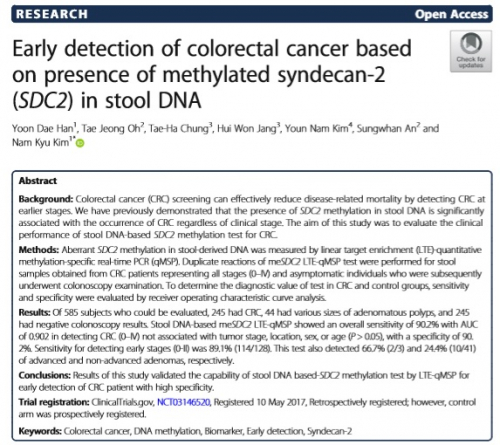기업
Genomictree’s diagnostic kit can predict 90 % of colorectal cancer.
by Jongwon Jang
Yonsei University College of Medicine’s research team of Profs. Kim Nam-Gyu and Han Yun-Dae has released clinical trial results in the latest issue of Clinical Epigenetics... The early-detection scree

On the first day of Genomictree’s listing on the KOSDAQ, the clinical results of its core product ‘EarlyTect-Colon Cancer’ were released. The results show positivity of more than 90 % for the detection of colorectal cancer by analyzing DNA in the stool.
In August 2018, Genomictree's colorectal cancer diagnostic kit was approved by the Korean Food and Drug Administration as a Class III medical device.
The research team (Department of Colorectal Surgery) of Profs. Kim Nam-Gyu and Han Yun-Dae of Yonsei University Severance Hospital released the results of a clinical trial that was conducted on a new early colorectal cancer screening tool together with Genomictree. The clinical results were published under the title ‘Early detection of colorectal cancer based on the presence of methylated Syndecan-2 (SDC2) in stool DNA’ in the latest issue of ‘Clinical Epigenetics’, which is a world-renowned epigenetics academic journal with an Impact Factor of 6.091.
The research team evaluated the accuracy and sensitivity of an early-detection technology that utilizes ‘Syndecan-2 (SDC2) methylation’, a novel epigenetic biomarker, to detect the occurrence of colorectal cancer and polyps. A national project conducted jointly by the research team of the Yonsei University College of Medicine and Genomictree released the finding that ‘Syndecan-2 (SDC2) methylation’ plays the role of a biomarker for colon cancer.
The research team started the clinical trial by targeting 585 patients who visited Yonsei Cancer Center and Severance Hospital through proactive and retroactive mixed design. The subjects included 245 patients who were diagnosed with colon cancer at Yonsei Cancer Center. The clinical trial was also participated in by 245 people who were diagnosed to be normal, 62 people with polyps, and 23 people and 10 people who were diagnosed with stomach cancer and liver cancer by colonoscopy, respectively, during their medical checkup at Severance Hospital.
With prior consent, the research team collected DNA samples of all subjects, and conducted a DNA clinical study on each stool DNA sample. The results showed the sensitivity (true positive rate) of the detection of colon cancer, regardless of the stage or location of tumors, or the sex or age of the subjects, to be 90.2 %, and the specificity (true negative rate) to detect the absence of a disease to also be 90.2 %.
In particular, the diagnostic sensitivity of Stage 0-2 colorectal cancer was 89.1 % (114 positives out of 128 people), which confirmed the effectiveness of the early colorectal cancer detection kit.
In addition, the product also shows a high sensitivity to colonic polyps (colorectal polyps) that are likely to develop into colon cancer. The new test method showed a significantly high positive rate even for large polyps of 10 mm or more, and it was confirmed that it is possible to diagnose only colon cancer precisely, because it showed a very low positive rate in the case of gastric cancer and liver cancer.
Professor Kim Nam-Gyu, who led the research team, said, “Due to the complicated preparation for colonoscopy, such as emptying intestines and patients’ fear, the participation rate is as low as 30 %. The new test is similar to the existing fecal occult blood test, in that it uses stool samples, but it can detect the presence of colorectal cancer with much higher accuracy.”
The researchers found that the early colon cancer detection screening product based on the ‘Syndecan-2 (SDC2) methylated’ biomarker had comparable sensitivity to colon cancer diagnosis, in comparison with local products currently available on the market after FDA approval, while it requires a small amount of stool, and has a short test time and high scalability. The research team plans to secure the accuracy and reliability of the early-detection screening product through a large-scale cohort study.


















